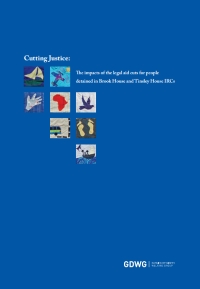Gatwick Detainees Welfare Group examines impacts of Legal Aid, Sentencing and Punishment of Offenders Act for people in immigration detention
The Gatwick Detainees Welfare Group (GDWG) last month released a report on the impact of legal aid cuts on immigration detainees.
GDWG is an independent charity providing emotional and practical support to people detained under immigration powers in Brook House and Tinsley House immigration removal centres by Gatwick Airport.
 You can read the 52-page report here.
You can read the 52-page report here.
The report aimed to address the lack of research as to the impacts of Legal Aid, Sentencing and Punishment of Offenders Act 2012 (LASPO) for people in immigration detention.
GDWG found that over three quarters of detainees surveyed for the report would not qualify for access to free legal advice for some or all of their immigration case, regardless of means or merits. Detainees said the lack of legal aid left them feeling stressed, worried and powerless.
Detainees attending legal surgeries at detention centres were found to be frequently advised that they cannot receive assistance for their immigration case unless they can pay privately.
The report says that those hit hardest by the cuts are people with an established private or family life in the UK, including those who have children in the UK, and those who have lived in the UK for many years. Just over a fifth of detainees with cases partly or fully out of scope for legal aid said they had arrived in the UK when they were under 18 years old.
In terms of legal representation, GDWG found that more than 85% of those whose cases fell entirely outside of scope for legal aid had a private legal representative, compared with just over 20% of those whose cases did fall in scope, but who had opted to pay privately.
Of those, 77% said they had to rely on family and friends to pay for part or all of their legal fees. One detainee said some people were getting in serious debt in order to pay.
"People desperate to get legal representation are often not sure how to establish whether their solicitor is good quality and are vulnerable to exploitation from unscrupulous private solicitors," the report stated.
Pro bono organisations are said to be overstretched, with just one person surveyed receiving pro bono legal representation.
About a third of people partly or fully out of scope for legal aid represent themselves as an alternative, but this is seen as a last resort, the report said, as those in immigration detention face significant barriers to representing themselves effectively for their immigration cases with the result that meaningful access to justice is significantly compromised.
All detainees interviewed by GDWG said LASPO had a negative impact on their emotional and psychological wellbeing, with detainees describing stress, worry and powerlessness associated with trying to find a legal representative, struggling to pay private solicitors and struggling to represent themselves.
"I was just stressed [trying to find legal representation], I didn't know what to do, I couldn't sleep… Up til today I'm still not sleeping well," one detainee said.
The report recommends that immigration matters should be brought back into scope for legal aid and that legal representatives should be paid to make exceptional case funding applications.